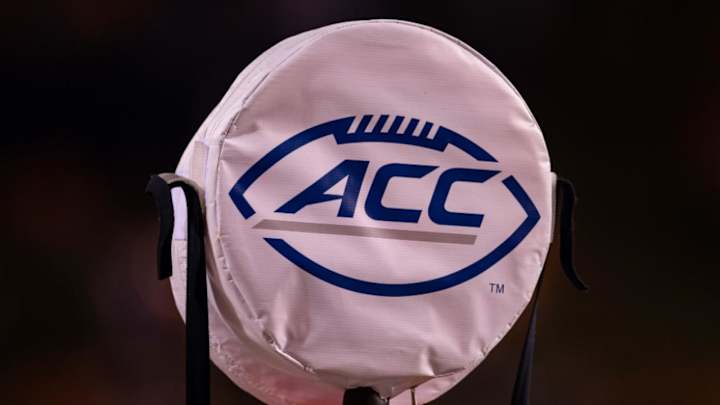Four Schools and Five Questions for ACC Realignment: FSU, Clemson, UNC and Miami

Time to think critically about what’s happening with four members of the Atlantic Coast Conference and realignment, as they would probably be the most likely to bolt to another conference. Or would they? To figure it out one way or another, five valuable questions are asked, with insights as well.
The four schools are ones most ACC fans would probably expect: Florida State, North Carolina, Clemson and Miami.
Any number of them could A) leave the ACC, B) all but be forced to stay put due to the grant of rights, and C) consider the possibility of adding additional members to the conference instead of leaving, among other options.
Wild times, wild times indeed.
With those opening thoughts in mind, do note that each of the Seminoles, Tigers, Tar Heels and Hurricanes will likely possess different criteria and reasons for what happens next. The following questions only scratch the surface of the varying needs.
The complexity of all the different answers for the questions below make it frustrating; it’s also why there’s so much intrigue with conference realignment, ACC or otherwise.
1) If one or both of FSU and Clemson bolt, and possibly UNC as well, what would that do for the Miami Hurricanes’ options?
SEC? Would SEC head football coaches really want to compete against the Canes – especially for South Florida recruits – with them being the local team and then also merging it with the power of being in college football’s most dominant league? Highly unlikely.
That’s still not entirely out of the question, and there could be other options like the following one, too.
The Big 10 would seem like a league that would be more interested in adding Miami because it would add a new television market, and its member schools would actually possess more chances to head to the Sunshine State to recruit top talent in football and other sports as well. Something to consider.
2) With FSU and Clemson being the most often rumored to leave, the main question would be why those two?
Well of course there are numerous possible answers, but cash is king. That has to be at least part of the reason, right?
Seeing how the SEC is swimming in money with its television deals, and the same with the Big 10, as well as more and more expected to come during the next few decades for both leagues, it’s a safe assumption that FSU and Clemson want a part of that pie. Hard to blame them.
In the following collage, which of the four #ACC teams would be most likely to leave the conference?#UNC | #Clemson | #FSU | #Miami | #Big10 | #SEC pic.twitter.com/PaymfzZ64k
— All Hurricanes (@AllHurricanes) August 10, 2023
They are also two schools that possess the most current ACC football power, i.e. teams with College Football Playoff aspirations (at least for 2024). They want as much money for their efforts, and then there’s what can be done with that currency.
Those finances can also be turned into new on-campus building projects, new athletic-only facilities, scholarship funds, coaching salary increases, savings, and many more opportunities. Again, it’s about the cash, as it leads to an almost unlimited number of options.
3) Enough about teams leaving, why couldn’t the ACC add a few teams?
Sure, that’s definitely an option, or perhaps not. Which team would add value – doing so from a logistical, social, and financial perspective – that’s willing to join the ACC?
Notre Dame is the slam dunk (or touchdown) answer here. The Irish value independence, however. There's West Virginia, but it's not as big a brand as some of the current ACC members would possibly like. Options after that are complex.
Checking off each of the three boxes in that last question would be hard, not that there isn't one obvious answer. Notre Dame is the slam dunk (or touchdown) answer here. The Irish value independence, however.
There's West Virginia, but it's not as big a brand as some of the current ACC members would possibly like. Options after that?
There could be a somewhat unusual way to do it. Add traditional Big East schools as basketball-only members.
The likes of, but not limited to, Connecticut, Georgetown, Providence, Villanova, Seton Hall and St. John’s, that would be a unique way to help out and have a basketball-dominant conference. That would also help to keep teams along Tobacco Road happy (possibly happy?), as well as adding to the ACC coffers in the process.
Of course all of that gets into more lawyer discussion points with getting out of conference contracts elsewhere, but hey, having those teams join the ACC is a thought.
4) Looking at 2024 and If Clemson and FSU bolt for the Big 10, how would the short-term football scheduling work?
Anyone that wants to take on this question, have at it. That’s a nightmare! Replacing games, one year out, in today’s world of scheduling that sees teams sign home-and-home agreements 10-plus years in advance, that’s a daunting task.
5) Will Tobacco Road mainstay and basketball power North Carolina really be a part of the corn belt, i.e. Big 10?
Hard to fathom. It just is. Forget the money. Take away the logistics even. Consider the open line from the play-by-play commentator of a Big 10 basketball game between otherwise bluebloods of college hoops.
“Coming to you live from Bloomington, Indiana, it’s Big 10 foes, the Indiana Hoosiers hosting the North Carolina Tar Heels!”
That just doesn’t sound right. Neither does a lot of the other conference realignment that’s been going on.
AllHurricanes.com is your home for all things Miami Hurricanes football, recruiting, basketball and other athletics, all the time. Follow along on social media at @AllHurricanes on Twitter and All Hurricanes on Facebook for round-the-clock news and analysis.
